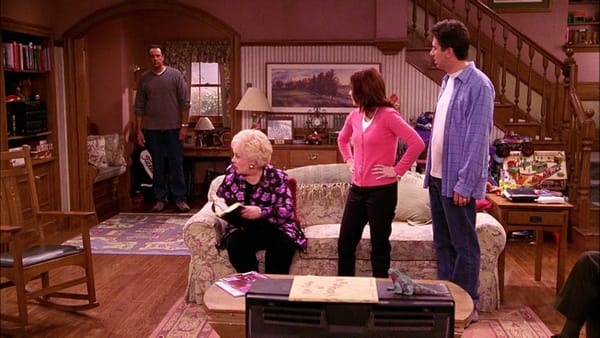We've forgotten the power of protest musicals' most popular songs
"Let the Sunshine In" from Hair and "Seasons of Love" had all their context stripped away for an awful inauguration medley.

(Welcome to the Wednesday newsletter! Each week, I’m publishing a new pop culture essay from a freelancer. Remember: Your subscription fee helps me pay these freelancers for their efforts! This week: Casey Berner on how a medley of Broadway songs at Joe Biden’s inauguration stripped those songs of their context and made them meaningless.)
You would be forgiven if you forgot that “Let the Sunshine In,” the famous final song of the musical Hair, quotes two of Shakespeare’s tragedies. I nearly forgot this fact myself, and I’ve written a fair amount on Hair and the New York Shakespeare Festival.
Hair follows a group of young hippies (called ‘the Tribe’) as they protest, take drugs, and create satirical performances in attempts to break free of conservative, consumerist activities and mindsets. The show’s nontraditional narrative form, frank discussions of race and sexuality, and on-stage nudity contributed to Hair’s reputation as a radical work.
“Let the Sunshine In” is one of the show’s most well-known songs, but the famous chorus of “let the sunshine in” is actually the second half of the song. The number, which is formally titled “The Flesh Failures (Let the Sunshine In),” begins with the show’s main character, Claude, going off to his conscription and eventual death in Vietnam. When the Tribe says goodbye to Claude, they borrow from the Bard:
Eyes, look your last
Arms, take your last embrace
And lips, oh you the doors of breath
Seal with a righteous kiss
Seal with a righteous kiss
The rest is silence
The first four lines are Romeo’s suicidal goodbye to his beloved, while the final line contains Hamlet’s last words. Claude reprises his earlier “Manchester England” in countermelody, his last words (“That’s me”) coinciding with Hamlet’s. When the famous chorus of “let the sunshine in” begins, the Tribe builds it in a haunting crescendo, until (as stage directions in the 1995 script note) “THEY all start to leave the stage, revealing CLAUDE lying center, on a black cloth.” There is no celebration, no joy.
As Kembrew McLeod put it, “‘The Flesh Failures (Let the Sunshine In),’ could easily be reduced to a hippie cliché, but it was a sober reminder of the horrors of the Vietnam War when the death of Hair’s main character, Claude, was revealed on the Biltmore Theatre’s stage. ‘Nobody was smiling, nobody was waving the peace sign, nobody had flowers, it was very serious stuff,’ [actor Walter Michael] Harris recalled.”
Yet the mournful verse the Tribe sings, as well as Claude’s final indictment of the culture that led the US into the Vietnam War (“Facing a dying nation of moving paper fantasy/ Listening for the new told lies”), were cut from the version of the song featured in the medley performed at the Inauguration of Joe Biden in January.
The Inaugural concert segment paired “Let the Sunshine In” with a song from another famous protest-musical. The Broadway medley, which featured a panoply of musical theatre stars from Hamilton’s Christopher Jackson and Renee Ellis Goldsberry to Tony- and Presidential Medal of Freedom-winner Chita Rivera, opened with “Seasons of Love,” Rent’s funereal gospel-inflected number. Fans of the show, and former theatre kids aged roughly 25-40, will connect it implicitly to one character’s AIDS-related death in act two, although the song actually occurs in outside of space and outside of time within the show’s reality. The song works in subtext, speaking to celebrations of life and love amid grief and hardship.
The cut to “Let the Sunshine In” within the medley was a deliberate choice by the coordinators of the number. Seth Rudetsky, who produced and arranged the segment, noted that “Let the Sunshine In” was his first thought when asked to put together a Broadway-related bit for the Inauguration. But he “soon thought of the lyrics before the chorus of ‘Let the Sunshine In’ and realized it would be very weird to have people celebrating the inauguration while singing about a ‘spider web sitar.’” Rudetsky settled on the medley when he realized that “‘Let The Sunshine In’ was this joyous call-to-action, but we thought ‘Seasons Of Love’ really represented what we had been through, especially over the last year.”
I disagree with Rudetsky. “Let the Sunshine In” can only seem to be a joyous song at all by cutting its opening lyrics brimming with anger and sorrow, and any song asking us to “celebrate/remember a year in the life of friends” (as “Seasons of Love” does) feels oddly, intensely disconnected from a year of social distancing and a mass of lonely deaths. While Broadway sang, “It’s time now/to sing out” on TV, deaths from COVID-19 were peaking across the country. More than 4,000 people took their final breaths on Inauguration Day.
Both Hair and Rent emerged as counter-cultural responses to federal failures that led to mass death — for Hair the Vietnam War, for Rent the AIDS Crisis (Rent is admittedly less specific in its political aims than Hair, responding more generally to converging crises of AIDS, gentrification, and ‘sell out’ artists). That’s why I found it jarring to see songs from both shows used at a celebration of the federal government’s ‘return to normal’ after Trump’s four years in office.
Hair in particular sparked controversy when it first premiered. While largely received well in New York, early tours sparked protest and occasional violence, particularly around the show’s famous nude scene, its inverted US flag, and its frank references to homosexuality. The show was developed off-Broadway and later opened on Broadway at the end of the Lyndon B. Johnson administration, a mere seven months before the election of Richard Nixon in 1968. Hair took a hard-line antiwar stance during the deadliest year of the Vietnam War—a stance that “Flesh Failures (Let the Sunshine In)” invokes. While it’s hard to call any Broadway musical counter-cultural when Broadway is itself an institution of for-profit mass culture, Hair is about as close as any show could come.
Fifty years later, however, it is easy to argue Hair has been stripped of its anti-war message, of its grief and mourning. There is precedent for stripping away that grief. As Rudetsky points out, the popular “Aquarius/Let the Sunshine In” medley by The 5th Dimension that peaked at #6 on the Billboard 100 also cut the first half of “Flesh Failures,” popularizing the decontextualized but hopeful-sounding call to “let the sunshine in.” Perhaps through no fault of its own, Hair has fallen victim to the hippie cliches it once avoided.
“Seasons of Love,” by contrast, takes place outside the dramatic action of Rent. It asks the audience to remember and to celebrate life despite difficult circumstances, as the characters in the show attempt to create art and build community while raging against profit-seeking, selling out, and the AIDS Crisis. The show, while wildly popular in its day, has become more controversial as time goes on. Like Hair before it (and Hamilton afterward), it struggled to maintain any sort of counter-culture relevance when it became a mainstream success, but its message of hope in the face of hardship and plague has remained relevant.
Invoking Hair and Rent as the inauguration did, I would argue, takes part in what cultural critic Henry Giroux calls the “politics of forgetting.” This refers to a systematized ignorance where past violence goes unacknowledged and historical wrongs are widely forgotten, rewritten, or held at a distance from current events, and current violence. This works, Giroux argues, in part by translating social and political concerns into spectacle and entertainment.
As arranged for the inauguration, the medley sets us up to feel hope, with the first oh-so familiar chords of “Seasons of Love.” (If you know nothing else about Rent, you surely know those opening piano chords.) The medley then bursts into a joyous cacophony at the introduction of “Let the Sunshine In,” rather than letting the song build in its traditional crescendo. These songs, thus arranged, build from the quietly nostalgic beginning to loudly evoke hope and joy in listeners by the end.
But that hope depends on our forgetting many things. To enjoy “Seasons of Love/Let the Sunshine In,” we needed momentarily to forget that Hair especially was an antiwar show opposing the United States government’s deadly policies, particularly the draft. We needed to forget — as we have for other popular covers of the song — that Claude dies during the song. We needed to forget that 400,000 people had died of COVID-19 at that point, and that deaths were climbing every day. We needed to forget that every performer appearing in the medley is currently unemployed, and that current reopening plans in New York do not meet safety or wage standards for Actor’s Equity.
We needed to forget, too, the political struggles from before Trump’s time in office — the Black Lives Matter protests that began following Michael Brown’s death at the hands of police officer Darren Wilson in 2014, the mass deportations, the struggles for a fragile healthcare system that still very few can afford.
The medley’s arrangement aids our forgetting. As Rudetsky writes, “’Seasons of Love’ ends on an unresolved chord, and if we ended with ‘Let The Sunshine In’ instead, we could end with a big, joyous finish.” The unresolved ending of “Seasons of Love” sounds tense and unfinished to our ears; at the inauguration, this tension was resolved and completed by the decontextualized joy of “Let the Sunshine In.”
Of course one can forgive Rudetsky or anyone who forgot the manifesto and the eulogy that open “The Flesh Failures (Let the Sunshine In).” For 50 years, we’ve been forgetting the radical turns that Hair took. Those radical qualities have been ground down into more digestible bits, until the hippies’ mournful plea to “let the sunshine in” despite the government policies that led their friend to his death, today becomes a call for hope, for joy, in service of one federal administration changing into another. “Seasons of Love,” whose out-of-time quality within Rent allowed the song to become a show choir and school graduation staple, gives the medley nostalgia and sentiment.
Time and again, we are asked to forget governmental acts of violence, harmful policies, and broken promises. Even now, shortly into the new administration, the hopes Biden’s campaign promised — $2,000 survival checks, a higher minimum wage, an end to child detention — have all been chipped away at incrementally, even while some smaller measures have been passed. COVID-19 still runs rampant nationally, with new variants on the rise.
Yet we’re poised to forget these and to politely move forward, as we did from the Obama, Bush, Clinton, Bush, Reagan, etc. administrations. And meanwhile, the cultural language that once ran counter to a dysfunctional status-quo has been subsumed by it, its radical bits cast aside, ensuring that we forget the anger, forget the mourning, return only to the hopeful, happy parts.
The Flesh is continuing to Fail, in other words. We can’t defiantly live in face of these failures, as the Tribe called us to, unless we remember them, even as those who are in power wish dearly that we would forget.
Episodes is published three times per week. Mondays feature my thoughts on assorted topics. Wednesdays offer pop culture thoughts from freelance writers. Fridays are TV recaps written by myself. The Wednesday and Friday editions are only available to subscribers. Suggest topics for future installments via email or on Twitter. Read more of my work at Vox.




